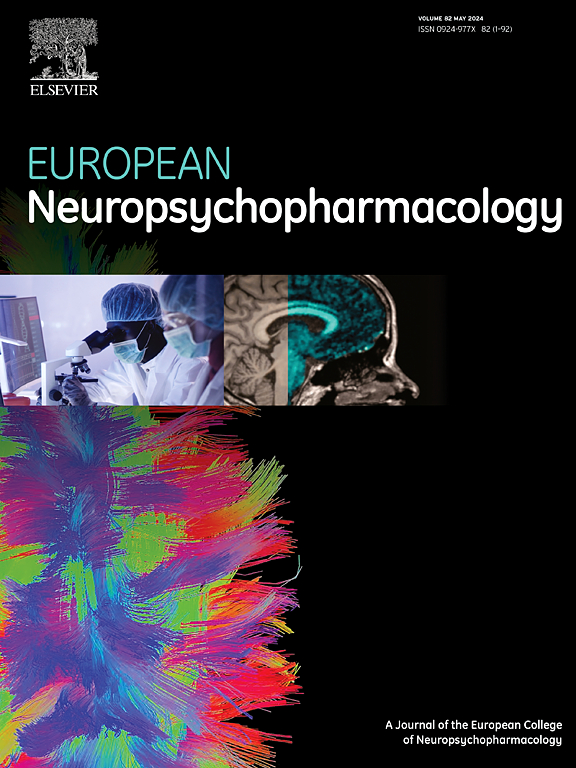通过整合遗传学和精神病学中的神经影像学,增强了对机制的洞察和预测
IF 6.7
2区 医学
Q1 CLINICAL NEUROLOGY
引用次数: 0
摘要
为了全面了解复杂的精神疾病,需要采用多模式方法。大脑结构和功能的改变沿着从遗传变异到定义精神疾病的行为症状的因果连续体而存在。结合神经影像学和遗传学可以扩大我们对精神疾病的潜在机制和病理生理学的理解。从这种多模式调查中获得的知识有可能为精神病学基因组学发现的临床翻译提供信息。本次研讨会将包括四个前沿研究报告,这些研究将常见或罕见的遗传变异与脑成像结合起来。为了理解和利用精神疾病的潜在生物学,演讲者使用了多模态方法和新颖的分析工具。每场演讲都将阐述如何整合来自精神病学、遗传学和神经影像学的数据来增强基因组学发现、推进机制洞察、改进预测和/或患者分层。Pravesh Parekh将介绍FEMA-GWAS工具,并展示其在绘制与大脑发育纵向变化相关的遗传变异图表上的应用结果,使用的数据来自青少年大脑认知发展研究。基因重叠与精神疾病的模式将被讨论。纳丁·帕克将介绍整合多基因和神经影像学风险评分的新研究,以改善对精神疾病的预测。这项工作结合了来自精神病学基因组学联盟(PGC)和通过荟萃分析增强神经成像遗传学(ENIGMA)联盟的数据。Rune Bøen将展示罕见的重复拷贝数变异与大脑结构之间的机制关系的多位点分析的新发现。利用诊断为自闭症谱系障碍和精神病的罕见基因变异携带者的数据,他的工作为精神疾病的神经生物学途径提供了信息。卡罗琳娜·马考斯基(Carolina Makowski)将介绍通过整合神经成像和代谢遗传学来提高对饮食失调机制理解的新工作。她将重点介绍代谢精神病学的遗传学见解及其与脑组织微观结构的遗传结构的交集,并讨论这些发现如何有助于神经性厌食症的治疗。研讨会的讨论者Jakub Kopal将全面介绍精神病学和神经影像遗传学的综合方法。特别强调将研究成果转化为临床实践。本文章由计算机程序翻译,如有差异,请以英文原文为准。
ENHANCED MECHANISTIC INSIGHTS AND PREDICTIONS THROUGH INTEGRATING GENETICS AND NEUROIMAGING IN PSYCHIATRY
To accomplish a comprehensive understanding of complex psychiatric disorders, a multimodal approach is required. Alterations in brain structure and function sit along the causal continuum from genetic variants to behavioural symptoms defining psychiatric disorders. Combining neuroimaging and genetics can expand our understanding of the underlying mechanisms and pathophysiology of psychiatric disorders. The knowledge gained from such multimodal investigations has the potential to inform clinical translation of psychiatric genomics findings.
This symposium will include four presentations of frontline research which incorporate common or rare genetic variants in conjunction with brain imaging. To understand and leverage the underlying biology of psychiatric disorders, the speakers use multimodal approaches and novel analytical tools. Each presentation will illustrate how integrating data from psychiatry, genetics, and neuroimaging can enhance genomic discoveries, advance mechanistic insights, and improve prediction and/or patient stratification.
Dr. Pravesh Parekh will introduce the FEMA-GWAS tool and show results from its application on charting the genetic variants associated with longitudinal changes in brain development, using data from the Adolescent Brain Cognitive Development Study. Patterns of genetic overlap with psychiatric disorders will be discussed.
Dr. Nadine Parker will present novel studies that integrate polygenic and neuroimaging risk scores for the improved prediction of psychiatric disorders. This work combines data derived from the Psychiatric Genomics Consortium (PGC) and the Enhancing NeuroImaging Genetics through Meta-Analysis (ENIGMA) consortium.
Dr. Rune Bøen will present new findings from the multi-site analysis of the mechanistic relationships between rare recurrent copy number variants and brain structure. Leveraging data from rare genetic variant carriers diagnosed with autism spectrum disorder and psychosis, his work informs neurobiological pathways of psychiatric disorders.
Dr. Carolina Makowski will present new work improving the mechanistic understanding of eating disorders through integrating neuroimaging and metabolic genetics. She will highlight genetically-based insights from metabolic psychiatry and their intersection with the genetic architecture of brain tissue microstructure, with a discussion on how these findings may help inform the treatment of anorexia nervosa.
Dr. Jakub Kopal, the symposium discussant, will present a comprehensive overview of integrative approaches in psychiatric and neuroimaging genetics. Particular emphasis will be placed on the translation of research findings into clinical practice.
求助全文
通过发布文献求助,成功后即可免费获取论文全文。
去求助
来源期刊

European Neuropsychopharmacology
医学-精神病学
CiteScore
10.30
自引率
5.40%
发文量
730
审稿时长
41 days
期刊介绍:
European Neuropsychopharmacology is the official publication of the European College of Neuropsychopharmacology (ECNP). In accordance with the mission of the College, the journal focuses on clinical and basic science contributions that advance our understanding of brain function and human behaviour and enable translation into improved treatments and enhanced public health impact in psychiatry. Recent years have been characterized by exciting advances in basic knowledge and available experimental techniques in neuroscience and genomics. However, clinical translation of these findings has not been as rapid. The journal aims to narrow this gap by promoting findings that are expected to have a major impact on both our understanding of the biological bases of mental disorders and the development and improvement of treatments, ideally paving the way for prevention and recovery.
 求助内容:
求助内容: 应助结果提醒方式:
应助结果提醒方式:


